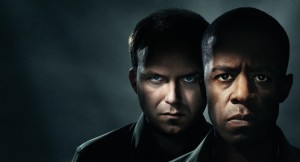EMILIA.
I will be hang’d, if some eternal villain,
Some busy and insinuating rogue,
Some cogging, cozening slave, to get some office,
Have not devis’d this slander; I’ll be hang’d else.IAGO.
Fie, there is no such man; it is impossible.Othello, Act IV, Scene 2
Last night we went to the Leicester showing of the National Theatre Live broadcast of Othello, starring Adrian Lester as Othello and Rory Kinnear as the arch-villain Iago. Rory Kinnear was mesmerising – a lurking, dissembling, scheming devil, a man who pretends friendship and loyalty and love and uses the trust of others to bring them to ruin. He is a bitter man, a vengeful man, but never an illogical man. His motivation is clear – he has been passed up for promotion, and believes that his wife has betrayed him. He places the blame for both directly on Othello, so determines to bring him to his undoing.
My first completed novel, The Chimney Rabbit, doesn’t have such a clear-cut villain. Mr. Poggly, the chimney sweep who leaves Giovanni stuck up a chimney, isn’t an evil bear – he’s selfish and lazy and weak, but not wicked. The fox wants to eat Giovanni, but he’s skinny and hungry. Victoria and Kitty are unpleasant cats, and their scheme to sell the mice into slavery is wicked, but aren’t directly after Giovanni. In the second half of the book, the pirate Captain Sock takes the part of antagonist, and comes closest to being a genuine traditional villain.
The sequel, The Chimney Rabbit and the Underground Mice, has shadowy business interests driving the villainy.
For my latest novel, Tales of the Ancient Rabbits, I decided that what I wanted was a real villain. An antagonist who would appear in chapter 1 and maintain a presence right through until the end of the book. But there’s no point having a pantomime villain, who does bad things just because he’s bad. Real villains, like Iago, have motivation. Real villains don’t consider themselves the villains of their own tale – they consider themselves justified.
Enter Niccolo – a young aristocratic dog who becomes Roberto’s nemesis. He is a traitor, but he considers the betrayal of his city to be simply a matter of business. He can pretend friendship, and to everyone but Roberto he seems the model of decency and propriety.
I like Niccolo. There’s something rotten at his core, something that makes him throw away all the privileges he’s been given, and refuse to take responsibility for his own situation, but still, he’s clever and resourceful and determined. When Roberto tells him to go and seek his own fortune, to go out into the world and make his own way, I know that he will, and he’ll succeed – but I also know that he’ll end up doing something illegal or immoral. After all, at heart, he’s a villain.
